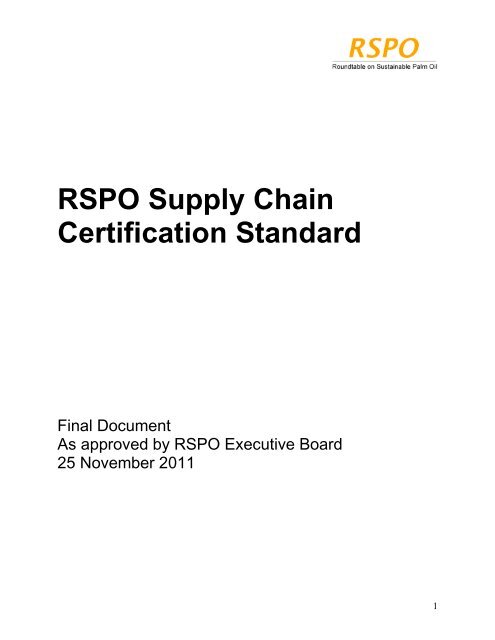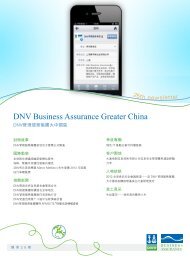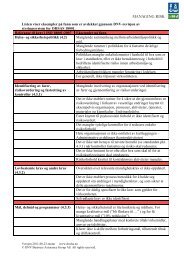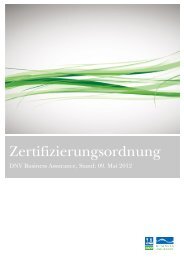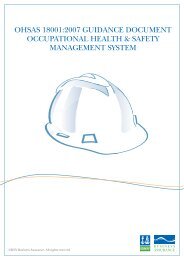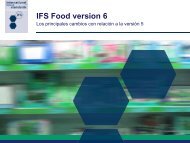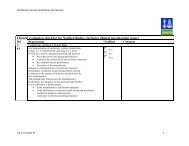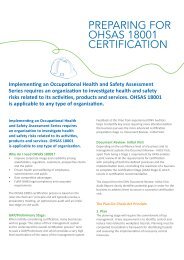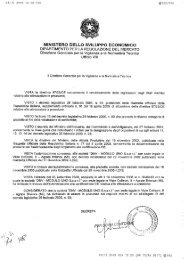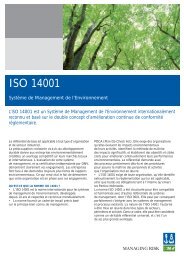RSPO Supply Chain Certification Standard - DNV Business Assurance
RSPO Supply Chain Certification Standard - DNV Business Assurance
RSPO Supply Chain Certification Standard - DNV Business Assurance
Create successful ePaper yourself
Turn your PDF publications into a flip-book with our unique Google optimized e-Paper software.
<strong>RSPO</strong> <strong>Supply</strong> <strong>Chain</strong><strong>Certification</strong> <strong>Standard</strong>Final DocumentAs approved by <strong>RSPO</strong> Executive Board25 November 20111
CONTENTS1. Introduction ............................................................................................................................. 32. Scope....................................................................................................................................... 33. How to use this document .................................................................................................... 44. Definitions ............................................................................................................................... 55. General <strong>Chain</strong> of Custody System Requirements for the <strong>Supply</strong> <strong>Chain</strong> ...................... 85.1. Applicability of the General <strong>Chain</strong> of Custody System Requirements for the supply chain85.2. Documented procedures ......................................................................................................... 85.3. Purchasing and goods in ......................................................................................................... 85.4. Outsourcing activities .............................................................................................................. 95.5. Sales and goods out ................................................................................................................ 95.6. Registration ............................................................................................................................. 105.7. Training .................................................................................................................................... 115.8. Claims ...................................................................................................................................... 116. Modular requirements ......................................................................................................... 12Module A – Identify Preserved .......................................................................................................... 13Module B – Segregation ..................................................................................................................... 14Module C – Mass Balance .................................................................................................................. 15Module D – CPO Mills: Segregation .................................................................................................. 17Module E – CPO Mills: Mass Balance ............................................................................................... 19Annex 1 Identity Preserved (IP) .......................................................................................... 23Annex 2 Segregation (SG) ................................................................................................... 24Annex 3 Mass Balance (MB) ............................................................................................... 25Annex 4 Book and Claim (BC) ............................................................................................ 26Annex 5 Yield Schemes ....................................................................................................... 272
1. IntroductionThe Roundtable on Sustainable Palm Oil (<strong>RSPO</strong>) is a global, multi-stakeholder initiative on sustainable oilpalm products. Members of <strong>RSPO</strong> and participants in its activities come from many different backgrounds,including plantation companies, manufacturers and retailers of oil palm products, environmental and socialNGOs and from many countries that produce or use oil palm products. The principal objective of <strong>RSPO</strong> is“to promote the growth and use of sustainable palm oil through cooperation within the supply chain andopen dialogue between its stakeholders”.The methods used by the <strong>RSPO</strong> to deliver its objective include:The development of a standard for certification of sustainable oil palm production and associatedmechanisms for verification of responsible oil palm production. The <strong>RSPO</strong> <strong>Standard</strong> for SustainableOil Palm Production, approved in October 2007, is presented as a series of Principles, Criteria,Indicators and Guidance, and is designed to be used by oil palm producers to implement sustainableproduction practices, and by certification bodies for field verification.The development of an <strong>RSPO</strong> <strong>Supply</strong> <strong>Chain</strong> <strong>Certification</strong> <strong>Standard</strong>, this document, which describesrequirements related to the control of <strong>RSPO</strong> certified oil palm products along the supply chain,including flows of material and associated claims.This <strong>RSPO</strong> <strong>Supply</strong> <strong>Chain</strong> <strong>Standard</strong> is presented as a series of auditable requirements designed to beused by organisations in the palm value chain to demonstrate implemented systems for control of <strong>RSPO</strong>certified oil palm products. Downstream processors or users of <strong>RSPO</strong> certified sustainable oil palmproducts can claim the use of (or support of) <strong>RSPO</strong> certified oil palm products when they adhere to therequirements the <strong>RSPO</strong> <strong>Supply</strong> <strong>Chain</strong> <strong>Certification</strong> <strong>Standard</strong> and this is independently verified by an<strong>RSPO</strong> approved and accredited certification body (see <strong>RSPO</strong> <strong>Supply</strong> <strong>Chain</strong> <strong>Certification</strong> Systemsdocument).This document will be reviewed within one year from the date of implementation and thereafter at intervalsnot greater than five years.2. ScopeThe oil palm products may go through many production and logistical stages between the grower and theproduct. Any individual batch of palm and palm kernel oil can be traded through one of four supply chainmechanisms that are approved by <strong>RSPO</strong>:Identity Preserved (Annex 1)Segregated (Annex 2)Mass balance (Annex 3)Book and Claim (Annex 4)For the first three of these, supply chain controls from the plantation through to the certified end productare required. This document sets out the minimum requirements for an organization controlling <strong>RSPO</strong>certified oil palm products for the <strong>RSPO</strong> Identity Preserved, Segregation, and Mass Balance supply chainoptions.3
Users of the <strong>RSPO</strong> Book and Claim system (GreenPalm), who are not producers, need to show:Compliance with the rules for use of the <strong>RSPO</strong> Book and Claim system (Currently the GreenPalmProgram Membership Rules: http://www.greenpalm.org/?/how_it_works/)Claims made are in accordance with the <strong>RSPO</strong> Rules on Communication & Claims3. How to use this documentThis is a modular document. It includes the following components:General <strong>Chain</strong> of Custody System Requirements for the <strong>Supply</strong> <strong>Chain</strong>, which apply to all certification unitsalong the supply chain, with the exception of CPO mills. The CPO mills need to comply with eitherModules D or E.Modular requirements for each supply chain option, consisting of the differing requirements which applyfor each of the different supply chain options applicable to organizations in the supply chain. For CPOmills, module D or E must be implemented. For all other organisations, modules A, B or C must beimplemented. One or more of these may be implemented in conjunction. The supply chain certificationassessment only covers the modules which the organization has implemented. The modules which havebeen covered by the assessment will be indicated in the scope of the supply chain certificate. Themodule(s) must be applied in addition to the General <strong>Chain</strong> of Custody System Requirements for the<strong>Supply</strong> <strong>Chain</strong>. The specific modules are:Module A – Identity PreservedModule B - SegregationModule C – Mass BalanceModule D – CPO Mills: SegregationModule E – CPO Mills: Mass BalanceModule F – Multi-site <strong>Certification</strong>4
4. DefinitionsAccreditationBodyApplicantAuditBill of LadingBook and Claim(BC)Bulking StationBuyer<strong>Certification</strong> body(CB)ClientCode of conductComplaintsProcedureConventionalPlantationsCrude Palm Oil(or CPO)Delivery (of acontract)End ProductManufacturerFacilityFOSFA(Federation ofOils, Seeds andFatsAssociations)Fresh FruitBunches (FFB)IdentityPreserved PalmOil (IP)Interim ApprovalProcedureLegal ownerOrganization responsible for assessing and accrediting <strong>RSPO</strong> certificationbodies against ISO/IEC Guide 17021:2006 and 65 and that is a member of theInternational Accreditation Forum (IAF) or a full member of the InternationalSocial and Environmental Accreditation and Labelling Alliance (ISEAL)’The operation seeking or holding certificationIndependent assessment by an <strong>RSPO</strong> approved certification body as part of thecertification processLegal shipping document that gives legal title to goods that are being shipped.See Annex 5: Book and Claim <strong>Supply</strong> <strong>Chain</strong> Model (BC) of the <strong>Supply</strong> <strong>Chain</strong><strong>Certification</strong> <strong>Standard</strong>sInterim storage facility for palm oil.The next commercial entity in the supply chain - supplier (or seller) is theprevious commercial entity in the supply chain.An independent body that is approved by <strong>RSPO</strong> to conduct certificationassessments against the intent and requirements of the <strong>RSPO</strong> <strong>Supply</strong> <strong>Chain</strong><strong>Certification</strong> Systems. See section 2 for more information the process ofapproval of certification bodies.see Applicant.The <strong>RSPO</strong> Code of Conduct is a set of requirements <strong>RSPO</strong>–members areexpected to abide by. The Code can be found on the website of <strong>RSPO</strong>:www.rspo.orgSee <strong>RSPO</strong> website (www.rspo.org)Mills and their respective supply bases that have not been certified by an <strong>RSPO</strong>approved certification body.First stage palm oil product produced from fresh fruit bunches (FFB) at a mill.The physical execution of a contract to terms, time and price by a supplier to hiscustomer.The manufacturer/processor that uses palm oil based products formanufacturing products designed and intended for consumption or end-use inany way e.g. retailers when producing own label products- in house, consumergoods manufacturers, biofuel producers, feed product manufacturers. Retailerand distributers of finished products, where no further modification occurs, donot need <strong>Supply</strong> <strong>Chain</strong> <strong>Certification</strong>.A single functional unit of an organisation or a combination of units situated atone locality, which is geographically distinct from other units.Global contract writing body for the international trade in fats and oils. Seewww.fosfa.orgBunches of palm fruits as harvested from the trees in the oil palmplantations/farms.See Annex 1: Identity Preserved <strong>Supply</strong> <strong>Chain</strong> Model (IP) of <strong>Supply</strong> <strong>Chain</strong><strong>Certification</strong> <strong>Standard</strong>s documentPragmatic, intermediate procedure to establish compliance with intent andrequirements of the <strong>RSPO</strong> <strong>Supply</strong> <strong>Chain</strong> <strong>Certification</strong> Systems. See Chapter 5for more details.Entity that has an enforceable claim or title to a property, and is recognized as5
Mass Balance(MB)Multi-site<strong>Certification</strong>Oil PalmProductsOn-Site AuditOriginOwnerRefineryThe Roundtableon SustainablePalm Oil (or<strong>RSPO</strong>)<strong>RSPO</strong> CertifiedSustainable PalmOil (or <strong>RSPO</strong>-CSPO)<strong>RSPO</strong> GuidelinesonCommunication& Claims<strong>RSPO</strong> IT SystemSegregation (SG)SellerSite:StringSupplier (orseller):<strong>Supply</strong> <strong>Chain</strong><strong>Supply</strong> <strong>Chain</strong><strong>Certification</strong>such by law.see Annex 3: Mass Balance <strong>Supply</strong> <strong>Chain</strong> Model (MB) of <strong>Supply</strong> <strong>Chain</strong><strong>Certification</strong> <strong>Standard</strong>s documentA term used for groups of plantations, farms, mils or refineries etc. broughttogether under a Central Office and administered using an Internal ControlSystem.Products produced from palm fruits and kernels. Depending on the context ofthe phrase ‘oil palm products’ in this document can also refer to products suchas shells, palm kernels, palm kernel oil (PKO), palm kernel expeller or productsderived thereof, olein, stearin palm fatty acids distillate (PFAD) that are derivedfrom fractionation of CPO.Physical visit to a permanent located facility by a (team of) representative(s)from an <strong>RSPO</strong> approved certification body.Term used in the commodity trade to designate the geographic location/area inwhich a commodity (in this case CPO) was produced.Person or entity that holds physical ownership of goods/plant/building etc.;examples include CPO, olein, stearin, processing facility etc.A refinery is a production facility that processes crude palm oil into products withmore value like refined palm oil.The not-for-profit Swiss registered foundation working to improve thesustainability of global palm oil production and use.Palm oil produced by a mill and its supply base that has been successfullyaudited to the <strong>RSPO</strong> Principles and Criteria by an <strong>RSPO</strong> approved certificationbody, as being compliant with the criteria set out in the <strong>RSPO</strong> <strong>Certification</strong>Systems document.Rules for use of communication and claims related to the use or support of<strong>RSPO</strong> certified palm oilWeb-based system for tracing <strong>RSPO</strong> certified palm oil throughout the supplychain from mill to refinery, under the supply chain models of Mass Balance,Segregation and/or Identity Preservedsee Annex 2: Segregation <strong>Supply</strong> <strong>Chain</strong> Model (SG) of <strong>Supply</strong> <strong>Chain</strong><strong>Certification</strong> <strong>Standard</strong>s documentsee Supplier.A single functional unit of an organisation or a combination of units situated atone locality, which is geographically distinct from other units.The situation where several parties are involved in trading the product and takelegal ownership of the physical product but do not actually take receipt of thephysical product. In this case, the relevant <strong>RSPO</strong> documents will go directlyfrom the first party in the string [often the shipper] to the final buyer. Althoughthe payment for product follows the full string. The final buyer shall receivedocuments from the first party just before the arrival of the ship in the port ofdestination. He then becomes physical owner of the goods and documents.The previous commercial entity in the supply chain - the buyer, or customer isthe next commercial entity in the supply chain.The series of processes/steps through which agricultural raw materials passfrom the primary producer through to the end product manufacturer (i.e. palm oilgrowing, milling, storage, transport, refining, manufacture, end product etc.).Downstream processors or users of <strong>RSPO</strong> certified palm oil can claim the useof (or support of) <strong>RSPO</strong> certified palm oil when they adhere to the <strong>RSPO</strong> <strong>Supply</strong>6
SystemsTraderUnit of<strong>Certification</strong><strong>Chain</strong> <strong>Certification</strong> Systems and this is independently verified by an approvedcertification body.Participant in the supply chain of <strong>RSPO</strong>-CSPO who purchases and sells palmoil or its derivatives and/or futures.All operators who take legal ownership and physically handle (including receiptinto storage tanks) <strong>RSPO</strong> Certified Sustainable oil palm products need to be<strong>RSPO</strong> supply chain certified. This requirement applies up to and including theend product manufacturer.7
5.3.2. The facility shall have a mechanism in place for handling non-conforming material/documents.This mechanism should also be used to take appropriate steps when the <strong>Supply</strong> <strong>Chain</strong> certification ofa supplier is found to be invalid.5.4. Outsourcing activities5.4.1. In cases where an operation seeking or holding certification outsources activities to independentthird parties (e.g. subcontractors for storage, transport or other outsourced activities), the operationseeking or holding certification shall ensure that the independent third party complies with the intentand requirements of the <strong>RSPO</strong> <strong>Supply</strong> <strong>Chain</strong> <strong>Standard</strong> 2 .5.4.2. Facilities which wish to include outsourcing within the scope of their <strong>RSPO</strong> <strong>Supply</strong> <strong>Chain</strong>certificate shall ensure the following:a) The facility has legal ownership of all input material to be included in outsourced processes;b) The facility does not relinquish legal ownership of the materials during outsourced processing;c) The facility has an agreement or contract covering the outsourced process with each contractorthrough either a signed and enforceable agreement with the subcontractor. The onus is on the facilityto ensure that certification bodies have access to the outsourcing contractor or operation if an audit isdeemed necessary.d) The facility has a documented control system with explicit procedures for the outsourced processwhich are shared with the relevant contractor.e) The facility seeking or holding certification shall furthermore ensure (e.g. through contractualarrangements) that independent third parties engaged, provide unrestricted access to their respectiveoperations, systems, and any and all information to certification bodies that are duly approved by the<strong>RSPO</strong> when this is announced in advance.5.4.3. The facility shall record the names and contact details of all contractors used for the processingor production of <strong>RSPO</strong> certified materials.5.4.4. The facility shall inform its certification body about the names and contact details of any newcontractor used for the processing or production of <strong>RSPO</strong> certified materials.5.5. Sales and goods out5.5.1. The facility shall ensure that all sales invoices or relevant documents, e.g. delivery notes, shippingdocuments and specification documentation, issued for <strong>RSPO</strong> certified oil palm products deliveredinclude sufficient information, this may include the following:The name and address of the buyer;The name and address of the seller;The loading or delivery date;The date on which the documents were issued;A description of the product, including the applicable supply chain model (Identity Preserved,Segregated or Mass BalanceThe quantity of the products delivered;2 This requirement should not apply to outsourced storage facilities where the management of the mass balance andinstructions for tank movements are controlled by the organization (not the tank farm manager).9
Any related transport documentation<strong>Supply</strong> chain certification reference number5.6. Registration5.6.1. <strong>Supply</strong> chain actors who take legal ownership and physically handle <strong>RSPO</strong> Certified Sustainableoil palm products and who are part of the supply chain of <strong>RSPO</strong> Certified Sustainable oil palmproducts before and up to the (final) refinery need to register their transaction in the <strong>RSPO</strong> IT Systemupon the moment of physical shipment 3 .Actors who must register include:Palm oil mills producing <strong>RSPO</strong> certified palm oil and palm kernel oilRefineries (The final refinery – the refinery that does not further deliver to other refineries directlyor indirectly via traders - only needs to confirm the receipt of shipments; it does not need to dosales announcements)Actors that do NOT need to register include:Traders that are part of a string and therefore legal owners, but do not physically handle thematerial (the Traceability number will accompany shipping documents)All operators after the final refinery, e.g. end product manufacturers and retailersFor definitions of legal owner, refinery, end product manufacturer and string, please see definitions insection 4. For more details on the registration please see the Guidelines on the <strong>RSPO</strong> IT System.3 At present, it is not yet possible to enter palm kernel product transactions into the <strong>RSPO</strong> IT System. Therefore, untilfurther notice, the reporting of trades into a central database will not be required. Trade will be monitored by <strong>RSPO</strong>accredited certification bodies as part of supply chain certification audits that also cover the palm kernel productsupply chain.10
5.7. Training5.7.1. The facility shall have a defined training plan, which is subject to on-going review and supportedby training records.5.7.2. The facility shall provide the training for all staff as required to implement the requirements of the<strong>Supply</strong> <strong>Chain</strong> <strong>Certification</strong> Systems.5.7.3. The facility shall keep records of the training provided to staff in relation to implementation ofthese requirements.5.8. Claims5.8.1. The facility shall only make claims regarding the use of or support of <strong>RSPO</strong> certified oil palmproducts that are in compliance with the <strong>RSPO</strong> Rules for Communications and Claims.11
6. Modular requirementsThe following section of the standard includes the <strong>RSPO</strong> <strong>Supply</strong> <strong>Chain</strong> system modules. An organizationmust implement at least one of the modules in addition to the General <strong>Chain</strong> of Custody Requirements forthe <strong>Supply</strong> <strong>Chain</strong> above. Several modules can be implemented simultaneously.The following modules are currently available:Module A – Identity PreservedModule B – SegregationModule C – Mass BalanceModule D – CPO Mills: SegregationModule E – CPO Mills: Mass BalanceModule F – Multi-site <strong>Certification</strong>12
Module A – Identify PreservedA.1 ProcessingA.1.1A.1.2A.1.3The facility can only use the same supply chain model as its supplier or go to a less strictsystem. Declassification/downgrading can only be done in the following order: IdentityPreserved -> Segregated -> Mass Balance -> Non <strong>RSPO</strong> certified oil palm products.The facility shall assure that the <strong>RSPO</strong> certified palm product is uniquely identifiable to a singlemill and its supply base and is kept physically isolated from all other oil palm sources in itsfacility. The systems shall guarantee the minimum standard of 95 % segregated physicalmaterial.The facility shall assure and verify through clear procedures and record keeping that the <strong>RSPO</strong>certified oil palm product is kept segregated from non-certified material including duringtransport and storage and be able to demonstrate that is has taken all reasonable measures toensure that contamination is avoided. The objective is for 100 % segregated material to bereached. The systems should guarantee the minimum standard of 95 % segregated physicalmaterial 4 ; up to 5 % contamination is allowedA.2 Record keepingA.2.1A.2.2The facility shall maintain accurate, complete, up-to-date and accessible records and reportscovering all aspects of these requirements.Retention times for all records and reports shall be at least five (5) years.A.2.4A.2.5The following trade names shall be used and specified in relevant documents, e.g. purchaseand sales contracts, e.g. *product name*/IP or Identity Preserved. The supply chain modelused should be clearly indicated.The facility shall provide documented proof that the <strong>RSPO</strong> certified oil palm product can betraced back entirely to the palm oil mill.13
Module B – SegregationB.1 ProcessingB.1.1B.1.2The facility can only use the same supply chain model as its supplier or go to a less strictsystem. Declassification/downgrading can only be done in the following order: IdentityPreserved -> Segregated -> Mass Balance -> Non <strong>RSPO</strong> Certified Palm ProductThe facility shall assure and verify through clear procedures and record keeping that the <strong>RSPO</strong>certified palm product is kept segregated from non-certified material including during transportand storage and be able to demonstrate that is has taken all reasonable measures to ensurethat contamination is avoided. The objective is for 100 % segregated material to be reached.The systems shall guarantee the minimum standard of 95 % segregated physical material 5 ; upto 5 % contamination is allowed.B.2 Record keepingB.2.1B.2.2B.2.4B.2.5The facility shall maintain accurate, complete, up-to-date and accessible records and reportscovering all aspects of these requirements.Retention times for all records and reports shall be at least five (5) years.The following trade names should be used and specified in relevant documents, e.g. purchaseand sales contracts, e.g. *product name*/SG or Segregated. The supply chain model usedshould be clearly indicated.The facility shall provide documented proof that the <strong>RSPO</strong> certified oil palm product can betraced back to only certified segregated material.14
Module C – Mass BalanceC.1 ProcessingC.1.1The facility can only use the same supply chain model as its supplier or go to a less strictsystem. Declassification/downgrading can only be done in the following order: IdentityPreserved -> Segregated -> Mass Balance -> Non <strong>RSPO</strong> Certified Oil Palm Products. 6C.2 Record keepingC.2.1C.2.2C.2.4The facility shall maintain accurate, complete, up-to-date and accessible records and reportscovering all aspects of these requirements.Retention times for all records and reports shall be at least five (5) years.The following trade names should be used and specified in relevant documents, e.g. purchaseand sales contracts, e.g. *product name*/MB or Mass Balance. The supply chain model usedshould be clearly indicated.C.3 Mass balancing systemC.3.1C.3.2C.3.3The facility shall ensure that the quantity of physical <strong>RSPO</strong> mass balance material inputs andoutputs (volume or weight) at the physical site are monitored on a real-time basis.The facility shall ensure that the internal material accounting system complies with thefollowing;a facility can only deliver Mass Balance sales from a positive stock.a facility is allowed to sell short 7<strong>RSPO</strong> data is valid from the date it was first recorded in the material accounting system. The<strong>RSPO</strong> data shall always be valid until the data has been allocated to outputs supplied by theorganization. Facilities allocate mass balance claims to products going out, ensuring that theinput matches the output, as specified in Annex 3.C.3.4C.3.5All volumes of palm oil fractions and derivatives that are delivered are deducted from thematerial accounting system according to conversion ratios stated by <strong>RSPO</strong>, with the exceptionof the option detailed in C.3.5, below. PFAD and other refining losses are neglected for thesake of simplicity in the Mass Balance system 8 .Facilities can purchase a certain volume of segregated sustainable palm and palm kernelproducts and use it to match the sales of equal volumes of palm product derivatives that then6 Mass balance system: a system in which the sustainability data on incoming consignments can be transferred tooutgoing consignments. The mass balance system allows for mixing of <strong>RSPO</strong> and non-<strong>RSPO</strong> certified palm oil at anystage in the supply chain provided that overall company quantities are controlled. The mass balance model isconstructed in such a way that volumes of <strong>RSPO</strong> certified product shipped, will never exceed volumes received by theend user.7Product can be sold before it is in stock8 NOTE for suppliers of sustainable palm fatty acid distillate (PFAD): The rule change has some effect on companiesthat sell Mass Balance sustainable PFAD. It is no longer possible to sell Mass Balance sustainable PFAD derivedfrom Mass Balance crude palm oil. Companies can still sell MB sustainable PFAD by taking advantage of the relevantoption within the Mass Balance rules where Segregated sustainable palm products can be used to match the sale ofequal volumes of Mass Balance sustainable palm product fractions.15
carry a Mass Balance claim without requiring a physical or chemical link between the acquiredsegregated product and the derivative that is sold under mass balance. Note: Segregated palmoil products cannot be used to offset mass balance claims on palm kernel products or viceversa. Note: This is not acceptable practice for EU biofuels.16
Module D – CPO Mills: Segregation<strong>Certification</strong> for CPO mills is necessary to verify the volumes of certified and uncertified FFB entering themill, the implementation of any processing controls (for example, if segregation is used), and volume salesof <strong>RSPO</strong> certified producers. A mill may be taking delivery of FFB from uncertified growers, in addition tothose from its own certified land base. If a mill processes certified and uncertified FFB withoutsegregating the material then only Module E is applicable.The estimated tonnage of CPO and PK products that could potentially be produced by the certified millmust be recorded by the certification body in the public summary of the certification report. This figurerepresents the total volume of certified palm oil product (CPO and PK) that the certified mill is allowed todeliver in a year. The actual tonnage produced shall then be recorded in each subsequent annualsurveillance report.The mill must also meet all registration and reporting requirements for the appropriate supply chain underthe approved <strong>RSPO</strong> supply chain managing organisation (<strong>RSPO</strong> IT System or Greenpalm).D.1 Documented proceduresD.1.1D.1.2The facility shall have written procedures and/or work instructions to ensure theimplementation of all the elements specified in these requirements. This shall include atminimum the following:a) Complete and up to date procedures covering the implementation of all the elementsin these requirementsb) The name of the person having overall responsibility for and authority over theimplementation of these requirements and compliance with all applicablerequirements. This person shall be able to demonstrate awareness of the facilitiesprocedures for the implementation of this standard.The facility shall have documented procedures for receiving and processing certified and noncertifiedFFBs.D.2 Purchasing and goods inD.2.1D.2.2The facility shall verify and document the volumes of certified and non-certified FFBs received.The facility shall inform the CB immediately if there is a projected overproduction.D.3 Record keepingD.3.1D.3.2D.3.3D.3.4The facility shall maintain accurate, complete, up-to-date and accessible records and reportscovering all aspects of these requirements.Retention times for all records and reports shall be at least five (5) years.The facility shall record and balance all receipts of <strong>RSPO</strong> certified FFB and deliveries of<strong>RSPO</strong> certified CPO, PKO and palm kernel meal on a three-monthly basis.The following trade names should be used and specified in relevant documents, e.g. purchaseand sales contracts, e.g. *product name*/SG or Segregated. The supply chain model usedshould be clearly indicated.17
D.4 Sales and good outD.4.1The facility shall ensure that all sales invoices issued for <strong>RSPO</strong> certified products deliveredinclude the following information:a) The name and address of the buyer;b) The date on which the invoice was issued;c) A description of the product, including the applicable supply chain model (Segregated)d) The quantity of the products delivered;e) Reference to related transport documentation.D.5 ProcessingD.5.1D.5.2D.5.3The facility shall assure and verify through clear procedures and record keeping that the <strong>RSPO</strong>certified palm oil is kept segregated from non certified material including during transport andstorage and be able to demonstrate that is has taken all reasonable measures to ensure thatcontamination is avoided. The objective is for 100 % segregated material to be reached. Thesystems should guarantee the minimum standard of 95 % segregated physical material 9 ; up to5 % contamination is allowed.The facility shall provide documented proof that the <strong>RSPO</strong> certified palm oil can be traced backto only certified segregated material.In cases where a mill outsources activities to an independent palm kernel crush, the crush stillfalls under the responsibility of the mill and does not need to be separately certified. The millhas to ensure that:The crush operator conforms to these requirements for segregationThe crush is covered through a signed and enforceable agreementD.6 TrainingD.6.1The facility shall provide the training for all staff as required to implement the requirements ofthe <strong>Supply</strong> <strong>Chain</strong> <strong>Certification</strong> Systems.D.7 ClaimsD.7.1The facility shall only make claims regarding the use of or support of <strong>RSPO</strong> certified palm oilthat are in compliance with the <strong>RSPO</strong> Rules for Communication and Claims.9 The background of guaranteeing the minimum standard of 95% segregated physical material is due to physicalintermixing of two product flows (certified and conventional oil) in processing, which is technically unavoidable.18
Module E – CPO Mills: Mass Balance<strong>Certification</strong> for CPO mills is necessary to verify the volumes of certified and uncertified FFB entering themill and volume sales of <strong>RSPO</strong> certified producers. A mill may be taking delivery of FFB from uncertifiedgrowers, in addition to those from its own certified land base. In that scenario, the mill can claim only thevolume of oil palm products produced from processing of the certified FFB as MB.The estimated tonnageof CPO and PK products that could potentially be produced by the certified mill must be recorded by thecertification body in the public summary of the certification report. This figure represents the total volumeof certified palm oil product (CPO and PK) that the certified mill is allowed to deliver in a year. The actualtonnage produced should then be recorded in each subsequent annual surveillance report.The mill must also meet all registration and reporting requirements for the appropriate supply chain underthe approved <strong>RSPO</strong> supply chain managing organisation (<strong>RSPO</strong> IT System or GreenPalm).E.1 Documented proceduresE.1.1E.1.2The facility shall have written procedures and/or work instructions to ensure theimplementation of all the elements specified in these requirements. This shall include atminimum the following:a) Complete and up to date procedures covering the implementation of all the elementsin these requirementsb) The name of the person having overall responsibility for and authority over theimplementation of these requirements and compliance with all applicablerequirements. This person shall be able to demonstrate awareness of the facilitiesprocedures for the implementation of this standard.The facility shall have documented procedures for receiving and processing certified and noncertifiedFFBs.E.2 Purchasing and goods inE.2.1E.2.2The facility shall verify and document the volumes of certified and non-certified FFBsreceived.The facility shall inform the CB immediately if there is a projected overproduction.E.3 Record keepingE.3.1E.3.2E.3.3The facility shall maintain accurate, complete, up-to-date and accessible records and reportscovering all aspects of these requirements.Retention times for all records and reports shall be at least five (5) years.a) The facility shall record and balance all receipts of <strong>RSPO</strong> certified FFB and deliveries of<strong>RSPO</strong> certified CPO, PKO and palm kernel meal on a three-monthly basis.b) All volumes of palm oil and palm kernel oil that are delivered are deducted from the materialaccounting system according to conversion ratios stated by <strong>RSPO</strong>.c) The facility can only deliver Mass Balance sales from a positive stock. However, a facility isallowed to sell short.19
E.3.4E.3.3The following trade names should be used and specified in relevant documents, e.g. purchaseand sales contracts, e.g. *product name*/MB or Mass Balance. The supply chain model usedshould be clearly indicated.In cases where a mill outsources activities to an independent palm kernel crush, the crush stillfalls under the responsibility of the mill and does not need to be separately certified. The millhas to ensure that the crush is covered through a signed and enforceable agreement.E.4 Sales and good outE.4.1The facility shall ensure that all sales invoices issued for <strong>RSPO</strong> certified products deliveredinclude the following information:a) The name and address of the buyer;b) The date on which the invoice was issued;c) A description of the product, including the applicable supply chain model (Segregatedor Mass Balance)d) The quantity of the products delivered;e) Reference to related transport documentation.E.5 TrainingE.5.1The facility shall provide the training for all staff as required to implement the requirements ofthe <strong>Supply</strong> <strong>Chain</strong> <strong>Certification</strong> Systems.E.6 ClaimsE.6.1The facility shall only make claims regarding the use of or support of <strong>RSPO</strong> certified oil palmproducts that are in compliance with the <strong>RSPO</strong> Rules for Communications and Claims.20
Module F – Multi-site <strong>Certification</strong>F.1 ScopeF.1.1The company shall define the geographic area, the number and identity of facilities, the supplychain model and the types of operations covered by the scope of their multi-site chain ofcustody system. Mass balance accounting can only be done at facility level.F.2 ResponsibilitiesF.2.1F.2.2F.2.3F.2.4F.2.5F.2.6The operational units shall demonstrate that they are part of the same Central Office.The Central Office shall justify the grouping of operational units into sets.The Central Office shall have a centrally administered and documented Internal ControlSystem (ICS) for the management and implementation of the <strong>RSPO</strong> chain of custodyrequirements.The Central Office shall appoint a management representative with overall responsibility forensuring that all operational units comply with the <strong>RSPO</strong> chain of custody requirements.The Central Office will have a procedure for raising corrective actions when it is found that anoperation unit is not in compliance with the <strong>RSPO</strong> SCCS.The Central Office shall have the authority to remove participating sites from the scope of themulti-site system if the requirements of participation, or any corrective action s issued by thecertification body or by the company itself, are not complied with by the participating site(s).F.3 TrainingF.3.1As part of the ICS, the Central Office shall establish and implement training for participatingsites to cover all applicable requirements of the <strong>RSPO</strong> multi-site chain of custody.F.4 Record keepingF.4.1F.4.2F.4.3F.4.4The Central Office shall maintain centralized accurate, complete, up-to-date and accessiblerecords for all participating sites and shall be responsible for maintaining reports covering allaspects of the <strong>RSPO</strong> multi-site requirements.The ICS shall determine and prepare which common management documents are applicableto all operational units.The ICS shall determine which site specific documents are required at each operational unit.The ICS shall keep all documents and records for a minimum period of 5 years.F.5 Internal auditsF.5.1F.5.2F.5.3F.5.4The Central Office shall conduct at least annual internal audits of each participating site toensure compliance with the multi-site chain of custody requirements.Non-conformances found as part of the internal audit shall be issued corrective actionrequests.The results of the internal audits and all actions taken to correct non compliances will beavailable to the certification body upon request.The outcomes of the internal audit programme shall be subject to review by top managementat least annuallyF.6 ClaimsF.6.1The ICS shall be responsible for ensuring that all uses of the <strong>RSPO</strong> logo and all <strong>RSPO</strong> claims21
egarding the end product are in accordance with <strong>RSPO</strong> requirements through its centralcontrol point.22
Annex 1 Identity Preserved (IP)DefinitionThe Identity Preserved (IP) supply chain model assures that the <strong>RSPO</strong> certified oil palm productsdelivered to the end user is uniquely identifiable to a single mill and its supply base and is kept physicallyisolated from all other oil palm sources throughout the supply chain (including other segregated <strong>RSPO</strong>-CSPO sources).ExplanationThe IP supply chain model requires that the grower, refiner, and supply chain maintains full separationand full traceability through to the delivery point at the end user. The end user will be assured that all ofthe physical palm oil received has come from a single uniquely identifiable <strong>RSPO</strong> certified mill and itssupply base and meets all of the required elements of the certification program.<strong>Supply</strong> <strong>Chain</strong> RequirementsThe basis of the supply chain requirements for IP requires proof of separation and full traceability of the<strong>RSPO</strong> CSPO and its derivatives throughout the supply chain originating at the and ending with the finaluser of the oil. The facility must ensure that the <strong>RSPO</strong> CSPO is kept physically isolated from all otherpalm oil sources and is unique identifiable to the mill and its supply base.Market Claim:See latest <strong>RSPO</strong> Rules on Communication and Claims23
Annex 2 Segregation (SG)Definition:The Segregation supply chain model assures that <strong>RSPO</strong> certified oil palm products delivered to the enduser comes only from <strong>RSPO</strong> certified sources. It permits the mixing of <strong>RSPO</strong> certified palm oil from avariety of sources.Explanation:The Segregation supply chain model assures that all of the physical product has originated from <strong>RSPO</strong>certified estates/plantations. However, the physical oil will not be uniquely identified to a specificestate/plantation as in the case of Identity Preserved.<strong>Supply</strong> <strong>Chain</strong> Requirements:The Segregation approach requires that the <strong>RSPO</strong> certified palm oil from estates/plantations is keptseparate from material from non-<strong>RSPO</strong> certified estates/plantations at every stage of production,processing, refining and manufacturing throughout the supply chain. This model does allow for the mixingof <strong>RSPO</strong> certified palm oil and its derivatives from various sources. Therefore the physical oil delivered tothe end user will not be fully traceable to the specific mill and its supply base.Market Claim:See latest <strong>RSPO</strong> Rules on Communication and Claims24
Annex 3 Mass Balance (MB)Definition:The mass balance supply chain model administratively monitors the trade of <strong>RSPO</strong> certified oil palmproducts throughout the entire supply chain, as a driver for mainstream trade in sustainable palm oil.Explanation:The mass balance supply chain model allows everyone within the supply chain to demonstrate theircommitment to sustainable palm oil production and to actively promote the trading of <strong>RSPO</strong> certified palmoil. This stimulates trading of certified product and will encourage industry to set up segregated supplychains and reach a mainstream level of sustainable palm oil trade. The mass balance system allows formixing of <strong>RSPO</strong> and non-<strong>RSPO</strong> certified palm oil at any stage in the supply chain provided that overallfacility quantities are controlled.Facilities can now purchase a certain volume of segregated sustainable palm and palm kernel productsand use it to match the sales of equal volumes of palm product derivatives that then carry a Mass Balanceclaim without requiring a physical or chemical link between the acquired segregated product and thederivative that is sold under mass balance. Note: Segregated palm oil products cannot be used to offsetmass balance claims on palm kernel products or vice versa. Note: This is not acceptable practice for EUbiofuels.<strong>Supply</strong> <strong>Chain</strong> Requirements:The basis of the supply chain requirements for mass balance will consist of reconciliation betweenquantity of <strong>RSPO</strong> material bought and the quantity of <strong>RSPO</strong> material sold. This includes control ofpurchases and sales of <strong>RSPO</strong> certified palm oil and its derivatives which will be independently verified.There will be no requirements for separate storing or controls in the production process.Market Claim:See latest <strong>RSPO</strong> Rules on Communication and Claims25
Annex 4 Book and Claim (BC)DefinitionThe Book and Claim supply chain model provides tradable certificates for <strong>RSPO</strong> certified palm oil to thepalm oil supply base. The supply base may then offer these certificates on a web based transactionsystem to end users who choose to support specific volumes of <strong>RSPO</strong> certified palm oil and or theirderivatives.Explanation:The book and claim system allows for the transfer of <strong>RSPO</strong> certified palm oil volume credits from the milland its supply base to the end user independently of the physical supply chain. The end user buys anequivalent amount of volume credits to the oil they buy in from their existing physical supply chain. The<strong>RSPO</strong> certified mill sells an equivalent volume of Crude Palm Oil, to the volume credits received, into theirexisting supply chain as conventional CPO.<strong>Supply</strong> <strong>Chain</strong> Requirements:Volume credits can only be introduced into the system by <strong>RSPO</strong> certified mills and their supply base up tothe annual output of the certification unit. Volume credits are traded electronically directly to endusers so there are only traceability requirements for the end product-manufacturer. Theserequirements are designed to ensure that all palm oil and/or its derivatives that are claimed to besustainable under this supply chain model are indeed covered by sustainable certificates.Market Claim:See latest <strong>RSPO</strong> Rules on Communication and Claims- For more information on the mass balance supply chain model contact the <strong>RSPO</strong> Secretariat26
Annex 5 Yield SchemesMass Balance <strong>Supply</strong> <strong>Chain</strong> Model Yield SchemeThe values shown in the Mass Balance <strong>Supply</strong> <strong>Chain</strong> Model below are fixed and cannot be modified.<strong>RSPO</strong> Mass Balance <strong>Supply</strong> <strong>Chain</strong> Model,including additional rule1.000 mt MB CPO1.000 mt SegregatedCPO / Palmproducts1.000 mt MB refined palm800 mt MB Oleine(80%)520 mtMBDubbleFracOleine(65%)280 mtMBPalmMidFraction(35%)200 mt MB Stearine(20%)130 mtMBStearinLiquidFraction(65%)70 mtMBStearinSolidFraction(35%)1.000 mt MBrefined palmproducts.(Refined, Oleine,Stearine, MultipleFrac products)27
Segregated <strong>Supply</strong> <strong>Chain</strong> Model Yield SchemeThe percentages in the Segregated <strong>Supply</strong> <strong>Chain</strong> Model below are indicative and operators may adjustthe values within a bandwidth of + and - 2%.Palm Kernel Mass Balance Yield SchemeCompanies that purchase Mass Balance sustainable palm kernel products shall use the followingharmonized yield scheme to calculate how much Mass Balance sustainable products they can sell orclaim:100 mt palm kernels > 45 mt palm kernel oil > 15.8 mt PKO stearin + 29.2 mt PKO olein.Companies that purchase segregated sustainable palm kernel products can choose either of two optionsto calculate how much sustainable palm kernel products they can sell or claim:1. Apply the Segregated claim to all subsequent derivatives;2. Use the purchase of segregated palm kernel products to offset sales of equal volumes of specific MassBalance palm kernel derivatives (not necessarily derived from the segregated product acquired).(www.rspo.org)28


